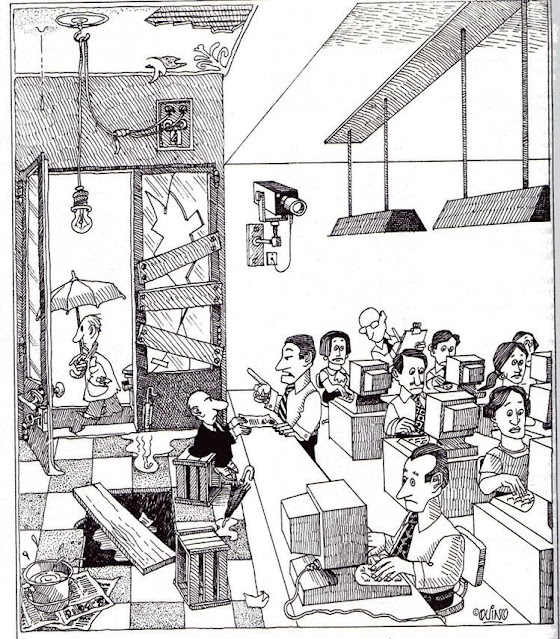Tormenta en el Mar de Galilea por Rembrandt, 1632.
Releía estos días aquel episodio evangélico de una barca que navega por la noche en la tormenta. Como llevo muchos meses viviendo una situación parecida de oscuridad, miedo y desesperanza no he podido evitar verme en esa escena como un marinero más angustiado y dando gritos. La verdad es que hay bastante barullo en la barca, sentimos que nos hundimos y que estamos al límite, tenemos pavor de esas olas y truenos que nos zarandean a su antojo sin que lleguemos a ver ni faro, ni tierra, ni puerto seguro. Las redes sociales no ayudan por la cantidad de barcas que en estos momentos están en situaciones similares. Los medios de comunicación tampoco con su incansable lista de tormentas y huracanes.
Esta mañana hablaba con un amigo que regresaba del camino de Santiago. Me hablaba de la importancia de volver a contactar con uno mismo y lo que ayudan la naturaleza, la conversación profunda y el silencio. En ese instante algo dentro se abrió. Efectivamente necesitamos como sociedad una cura de silencio que nos permita reencontrarnos con esa fuente de paz, vida y alegría que cada cual lleva dentro. Algo en principio gratuito y accesible como nos enseñan a diario nuestros animales de compañía o los más pequeños de la casa. La belleza de los verbos ser y estar, en contraposición al hacer permanente, el parloteo continuo, o la angustia existencial.
En los centros de salud vivimos tiempos recios. Como médico descalzo reconozco que nuestro aguante y capacidad son muy limitados. Pero hoy respiro algo más tranquilo, una pequeña esperanza se ha despertado en algún sitio y la aguas y el viento parecen más apaciguados.
The storm of noise and despair.
These days I was rereading that Gospel episode of a boat sailing through the night in a storm. As I have been living for many months in a similar situation of darkness, fear and despair, I couldn't help but see myself in that scene as another sailor, anguished and shouting. The truth is that there is quite a lot of commotion in the boat, we feel that we are sinking and that we are on the edge, we are terrified of those waves and thunder that toss us around at will without us being able to see any lighthouse, land or safe harbour. The social networks do not help because of the number of boats that are in similar situations at the moment. Neither do the media with their tireless list of storms and hurricanes.
This morning I was talking to a friend who was returning from the Camino de Santiago. He was talking to me about the importance of getting back in touch with oneself and how nature, deep conversation and silence help. At that moment something inside me opened up. Indeed, as a society we need a cure of silence that allows us to reconnect with that source of peace, life and joy that each one of us carries within. Something in principle free and accessible, as our pets or the little ones in the house teach us every day. The beauty of the verbs "to be" and "to be", as opposed to the permanent doing, the continuous chatter, or the anguish of existence.
We live in hard times in primary health centres. As a barefoot doctor I recognise that our stamina and capacity are very limited. But today I breathe a little easier, a little hope has awakened somewhere and the waters and the wind seem calmer.
喧嚣和绝望的风暴。
自动翻译,抱歉有错误。
这些天,我重读了《福音书》中关于一艘船在暴风雨中夜间航行的情节。由于我已经在类似的黑暗、恐惧和绝望的情况下生活了许多个月,我不禁在那个场景中看到自己又是一个水手,痛苦地喊叫着。事实是,船上有相当多的骚动,我们觉得我们正在下沉,我们已经到了极限,我们对那些随意折腾我们的海浪和雷声感到恐惧,而我们却看不到任何灯塔、陆地或安全港湾。社会网络没有帮助,因为目前处于类似情况的船只很多。媒体也不例外,他们不知疲倦地列出风暴和飓风的清单。
今天早上,我和一位从卡米诺-德-圣地亚哥回来的朋友聊天。他跟我谈了重新与自己接触的重要性,以及自然、深入交谈和沉默如何帮助。在那一刻,我内心的东西打开了。的确,作为一个社会,我们需要一种沉默的疗法,使我们能够重新与我们每个人内心深处的和平、生命和快乐的源泉联系起来。正如我们的宠物或家里的小家伙们每天教给我们的那样,有些东西原则上是自由的、可获得的。动词to be和to be的美,相对于永久的做,持续的唠叨,或生存的苦恼。
我们生活在卫生中心的困难时期。作为一名赤脚医生,我认识到我们的体力和能力都非常有限。但今天我的呼吸稍微平静了一些,某处唤醒了一点希望,水和风似乎也平静了。



No hay comentarios:
Publicar un comentario